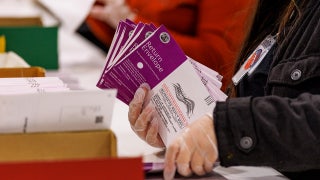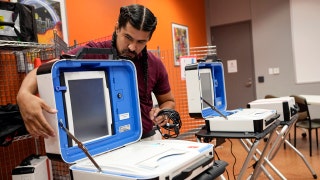New Supreme Court Justice Sonia Sotomayor completed the final leg of her formal confirmation process Tuesday with an investiture ceremony that marked the official commissioning of the court's newest associate justice, and it was a star-studded affair.
Along with family and friends, President Obama and Vice President Biden were in attendance. A number of the members of the Senate Judiciary Committee, including Chairman Patrick Leahy, D-Vt., were also on hand.
Even critic-turned-supporter, Senator Lindsay Graham, R-S.C., attended the event, seated just a row ahead of pop singing sensation Ricky Martin. Sotomayor donned her new robe for the first time publicly today, complete with an elaborate white collar.
Attorney General Eric Holder formally presented her commission to the court. The other eight justices stood as she was briskly sworn in by Chief Justice John Roberts and escorted to her seat, the last one on the left. It was previously occupied by Justice Samuel Alito, and the addition of a new justice meant everyone but the chief justice had to make a shift.
It may not take long to figure out if that shift is both literal and ideological. In a somewhat unusual move, the court will hear a controversial case for the second time on Wednesday. The special sitting comes a full month ahead of the court's next term, which kicks off Oct. 5. On Wednesday, Sotomayor will be the only justice who was not a part of the case when it was argued in the spring.
It involves a documentary about now-Secretary of State Hillary Clinton, produced and distributed when she was running for the Democratic nomination for the presidency back in 2008.
The Federal Election Commission viewed the film as a political advertisement, thus making it subject to campaign finance restrictions.
Wednesday’s case will take an in-depth look at the intersection of the First Amendment and political speech that has, at least in part, the backing of corporate dollars.
Sotomayor does have a substantive record when it comes to campaign finance law, and it is unlikely she will vote differently than retired Justice David Souter would have.
In a 1996 article she co-authored for the Suffolk University Law Review, Sotomayor likened campaign contributions to "bribes" and asked, "Can elected officials say with credibility that they are carrying out the mandate of a 'democratic' society, representing only the general public good, when private money plays such a large role in their campaigns?"
Sotomayor was a founding member of the New York City Campaign Finance Board, and has won praise for her willingness to address "the problem of big money in politics" from the Public Campaign Action Fund. The Court's opinion in Wednesday's case, Citizens United v. Federal Election Commission, is not expected for several weeks.












































